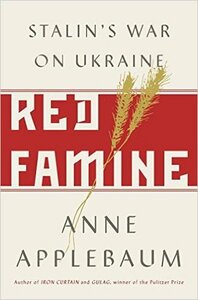Take a photo of a barcode or cover
challenging
dark
informative
reflective
sad
medium-paced
I first got this book after seeing a reference to it in the TV show Chernobyl. I found it absolutely fascinating and was slowly digesting it. However, the recent invasion of Ukraine by Russia meant that I finished it quickly.
And wow, what a great explanation. It really provides excellent context for what is happening now. It also provides a lot of history prior to the Holodomor in such a complete way. This book is meticulously researched and includes details I won't soon forget - but it is not done in a sensationalistic way.
Highly recommend!
And wow, what a great explanation. It really provides excellent context for what is happening now. It also provides a lot of history prior to the Holodomor in such a complete way. This book is meticulously researched and includes details I won't soon forget - but it is not done in a sensationalistic way.
Highly recommend!
challenging
dark
emotional
informative
sad
slow-paced
Graphic: Death
This was a difficult book for me to review. I commend Anne Applebaum for the research she must have painstakingly compiled, and I do believe that the famine was engineered to bring the Ukrainian people in line with the will of the Stalin and the communist leadership. I think that this is a important book, but it was difficult to read beyond its subject matter.
emotional
informative
reflective
sad
tense
medium-paced
I'm a quarter Ukrainian and a large portion of my academic career focused on 20th-century Europe, including three months studying Russia and the USSR abroad. Even with that background, I don't think I've ever been exposed to any specifically Ukrainian history beyond family stories and walking past the Holodomor memorial in DC. This book, sadly timely in spring 2022, fills a huge gap in my knowledge and I deeply appreciate it. Beyond describing what happened just in 1932-1933, it provides necessary context on the birth of Ukrainian nationalism, what happened in Ukraine in the 1920s, the suppression of Soviet atrocities from the 1930s to the 1990s, and how centuries of Russian/Soviet fear and discrediting of Ukrainian nationalism fed what's currently happening.
It's hard to say if this is a well-balanced history. There's definitely a strong anti-Soviet sentiment, but it honestly seems 100% warranted. I appreciated Appelbaum's embrace of complexity. Ukrainians both experienced atrocities and committed atrocities, were extremely prone to anti-Semitism, and many did initially welcome the Nazis in the 1940s. With both Ukrainian and Jewish heritage, my reaction is just sadness that humans have such a strong tendency to hate others when they're fearful and to hurt others when they've been hurt.
It's hard to say if this is a well-balanced history. There's definitely a strong anti-Soviet sentiment, but it honestly seems 100% warranted. I appreciated Appelbaum's embrace of complexity. Ukrainians both experienced atrocities and committed atrocities, were extremely prone to anti-Semitism, and many did initially welcome the Nazis in the 1940s. With both Ukrainian and Jewish heritage, my reaction is just sadness that humans have such a strong tendency to hate others when they're fearful and to hurt others when they've been hurt.
A vivid, visceral historical account of the long denied Holodomor (Ukrainian for “Terror Famine”) — Stalin’s intentional, genocidal quarantining and starving of Ukrainian peasants, who posed a political threat to the USSR between 1932 and 1933. It is one of the most unfathomably awful horrors of the terrible 20th century.
Applebaum is a gifted writer and historian, and her expansive research in previously sealed archives weaves primary source government documents together with searing personal accounts in gripping form. The government documents reflect a startling coldness toward the famine’s victims that was accepted by civil servants and fueled by the uncritical, ideological “othering” of peasants by the USSR. The personal accounts offer nightmarish visions of what it looked like on the ground as entire villages collectively, simultaneously starved to death over the course of months. The final product is a deeply felt monument to the suffering and erasure of the untold millions of people who died, a guide to better understanding the contemporary historical forces beneath Russia’s illegal occupation of Ukrainian land, and a warning of what people are capable of when the state drives dehumanization campaigns.
Applebaum is a gifted writer and historian, and her expansive research in previously sealed archives weaves primary source government documents together with searing personal accounts in gripping form. The government documents reflect a startling coldness toward the famine’s victims that was accepted by civil servants and fueled by the uncritical, ideological “othering” of peasants by the USSR. The personal accounts offer nightmarish visions of what it looked like on the ground as entire villages collectively, simultaneously starved to death over the course of months. The final product is a deeply felt monument to the suffering and erasure of the untold millions of people who died, a guide to better understanding the contemporary historical forces beneath Russia’s illegal occupation of Ukrainian land, and a warning of what people are capable of when the state drives dehumanization campaigns.




